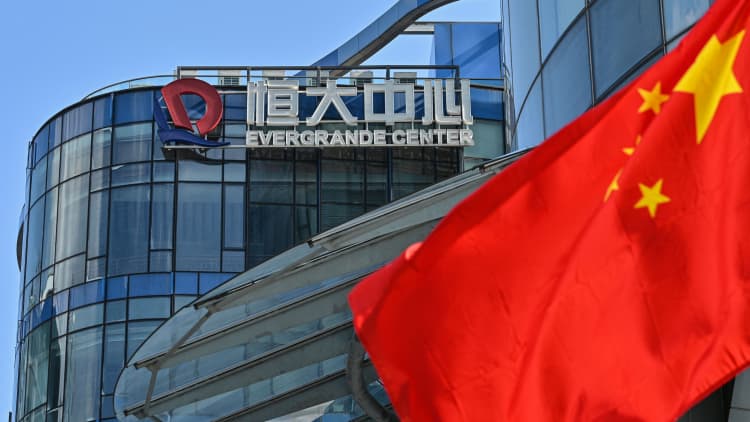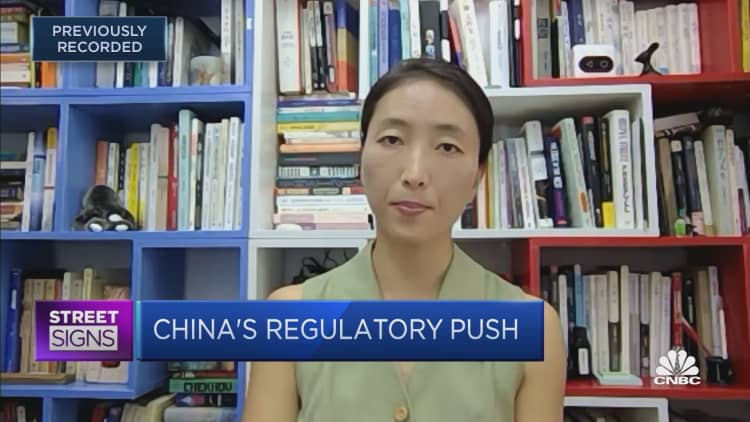
Chinese property giant Evergrande is on the brink of collapse, and analysts warn the potential fallout could have far-reaching implications that spill outside China's borders.
"Evergrande's collapse would be the biggest test that China's financial system has faced in years," says Mark Williams, chief Asia economist at Capital Economics.
Here's how bad its problems are, and what's in store for investors.

How did we get here?
After expanding rapidly for years and snapping up assets as China's economy boomed, Evergrande is now snowed under a crushing debt of $300 billion.
The world's most indebted property developer has been scrambling to pay its suppliers, and warned investors twice in as many weeks that it could default on its debts.
On Tuesday, Evergrande said its property sales will likely continue to drop significantly in September after declining for months, making its cash flow situation even more dire.
The Chinese developer is so huge that the fallout from a potential failure could hurt not only the Chinese economy, but spread to markets beyond.
Evergrande's collapse would be the biggest test that China's financial system has faced in years.Mark WilliamsCapital Economics, chief Asia economist
Banks have also responded to its deteriorating cash flow. Some in Hong Kong, including HSBC and Standard Chartered, have declined to extend new loans to buyers of two uncompleted Evergrande residential projects, said Reuters.
Ratings agencies have repeatedly downgraded the firm, citing its liquidity problems. Evergrande's problems intensified last year when China introduced rules to rein in the borrowing costs of developers. Those measures place a cap on debt in relation to a firm's cash flows, assets and capital levels.
Loading chart...
Its share price plunged nearly 80% so far this year, and trading of its bonds was repeatedly halted by Chinese stock exchanges in the past weeks.
What does Evergrande do?
Evergrande is everywhere. Its main business is in real estate, and it's China's second-largest property developer by sales.
- Evergrande owns more than 1,300 real estate projects in over 280 cities in China.
- Its property services management arm is involved in nearly 2,800 projects across more than 310 cities in China.
- The company has seven units dabbling in a wide range of industries, including electric vehicles, health-care services, consumer products, video and television production units and even a theme park.
- The firm says it has 200,000 employees, but indirectly creates more than 3.8 million jobs every year, according to its website.
- Evergrande's shares and bonds are included in indexes and funds across Asia.
Who will be affected?
The pool of affected parties include banks, suppliers, home-buyers and investors.
Evergrande warned this week its escalating troubles could lead to broader default risks.
It said that if it can't repay its debt, it may lead to a situation of "cross default" — where a default triggered in one situation may spread to other obligations, leading to broader contagion.
A banking failure triggered by the collapse of major property developers was the single most likely scenario that could lead to a hard landing in China.Mark WilliamsCapital Economics, chief Asia economist
1. Banks
The banking industry would be among the first to be hit if there are any contagion effects on the wider property sector in China, said Williams of Capital Economics.
"A banking failure triggered by the collapse of major property developers was the single most likely scenario that could lead to a hard landing in China. And the fact that financial markets aren't currently signaling alarm doesn't mean they won't," Williams wrote in a note last week.
2. Homebuyers and investors
Protests by angry homebuyers and investors broke out in recent days in some cities, and social unrest is among the concerns.
On Monday, around 100 investors turned up at Evergrande's headquarters in Shenzhen, demanding repayment of loans on overdue financial products — forming chaotic scenes, according to Reuters.
In fact, sentiment is already spreading to Asia high yield bonds. Yields on Asian offshore bonds, dominated by property firms, have spiked to an average of 13%, according to TS Lombard.
That also means offshore investors are at the losing end, the research firm said in a note last week.
"The company's guarantee to deliver all pre-sold projects is likely to lead to overseas stakeholders seeing little, if anything, from the ultimate sale of a developer's assets in the event of a bailout," said TS Lombard.

"Hence the prospect of an unequal swap, where the interests of on-shore lenders – households and banks – are protected at the expense of equity and off-shore bondholders," the note said.
3. Suppliers
The implications of Evergrande's failure could also reverberate through to other industries if suppliers are not paid. According to S&P Global Ratings, Evergrande might be "trying to persuade" its suppliers and contractors to accept physical properties as payment — in a bid to preserve cash for loan repayments.
I believe there will be some supporting measures from the central government, or even the central bank, trying to bail out Evergrande.Dan Wangeconomist, Hang Seng Bank
In an August report, S&P estimated that over the next 12 months, Evergrande will have over 240 billion yuan ($37.16 billion) of bills and trade payables from contractors to settle — around 100 billion yuan of that amount is due this year.
A paint supplier to Evergrande, Shanghai-listed Skshu Paint, said in a filing that the real estate firm repaid part of its debt in properties – and uncompleted ones at that.
Ratings agency Fitch said banks may also have indirect exposure to Evergrande's suppliers — the developer's trade payables stood at 667 billion Chinese yuan, according to Fitch analysis.
Is Evergrande too big to fail?
The government is likely to step in due to how important Evergrande is, according to analysts.
"Evergrande is such an important real estate developer, and it would be a strong signal if anything happened to it," said Dan Wang, an economist at Hang Seng Bank. "I believe there will be some supporting measures from the central government, or even the central bank, trying to bail out Evergrande."
But a restructuring could be more likely, according to other analysts.
"The most likely endgame is now a managed restructuring in which other developers take over Evergrande's uncompleted projects in exchange for a share of its land bank," Williams of Capital Economics said in a note last week.

It's likely that the government will prioritize homebuyers and banks over other parties, he said.
"Policymakers' main priority would be the households that have handed over deposits for properties that haven't yet been finished. The company's other creditors would suffer," Williams wrote.
Investment bank Natixis said the Chinese government will avoid "systemic risks" in the lead-up to the 2022 National Congress of the Chinese Communist Party, given its historical importance.
"However, this would also imply China Evergrande's debt crisis may snowball down the road," the bank said in a note, adding that economic growth will not mitigate financial losses as was the case in the past.


